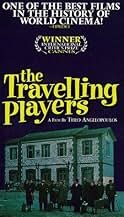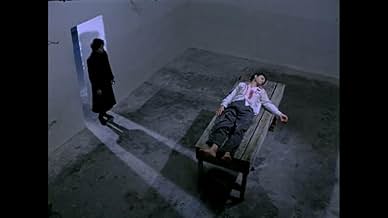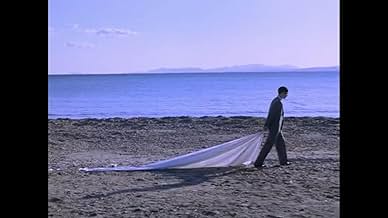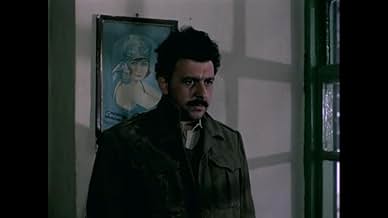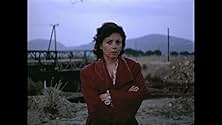O thiasos
- 1975
- 3 घं 50 मि
IMDb रेटिंग
7.8/10
4.6 हज़ार
आपकी रेटिंग
अपनी भाषा में प्लॉट जोड़ेंGreece, 1939-1952: Fascist, Nazi, and Communist conflict, as seen through the eyes of a family of travelling provincial players.Greece, 1939-1952: Fascist, Nazi, and Communist conflict, as seen through the eyes of a family of travelling provincial players.Greece, 1939-1952: Fascist, Nazi, and Communist conflict, as seen through the eyes of a family of travelling provincial players.
- निर्देशक
- लेखक
- स्टार
- पुरस्कार
- 12 जीत और कुल 2 नामांकन
फ़ीचर्ड समीक्षाएं
This is a landmark film, a must see for anyone that wishes to understand modern Greek history and politics. The plot is a loose retelling of the Oresteia cycle of tragedies by Aeschylus--the names of the characters (Orestes, Electra, Chrysothemis) are an obvious hint. Betrayal, revenge and redemption are only part of the story. It takes place in Greece between 1936 and 1952, years filled with fascist dictatorship, war, Axis occupation, civil war and repression. Greece's traumatic history is seen through the eyes of a traveling company of actors, who travel all around provincial towns to perform a single play: "Golfo", a pastoral tragedy told in folk-song-inspired rhyming couplets.
This is not a movie for action-loving, short-attention-span viewers. Angelopoulos and his long-time collaborator, renowned cinematographer Arvanitis, have developed a very distinctive style, and "O Thiassos" is an uncompromising example. There are no close-ups, very little panning, some slow tracking; shots are long (both in point of view and time); almost every shot is filmed in overcast conditions; actors are dwarfed by their surroundings, which are all unglamorous, even depressing in their wartime run-down look. One could say that the purpose is to accentuate the tragic, the sense that the characters are cogs in the machine of history; but ancient tragedy did the same in big style, opulent costumes, and terrifying masks. Angelopoulos' politics induces him to focus on ordinary people in ordinary surroundings instead. The result is strangely, hauntingly lyrical to many; a real downer for some.
The film came out in 1975, a year after the end of the dictatorial right-wing regime of the "colonels" (1967-74), and after decades of repression of communists and their sympathisers. Angelopoulos' point of view is sympathetic to the left/communist side. Under full democracy, it was finally allowed to be expressed. The film helped shape the political sensibilities of a whole generation of Greek baby boomers. Its sixteen-year trek (plod, some would say) through Greek history will probably bewilder non-Greek viewers, but it is a deeply affecting crash-course in what shaped contemporary Greece. It is also an impressive re-interpretation of tragedy, as original as any I have seen on film.
This is not a movie for action-loving, short-attention-span viewers. Angelopoulos and his long-time collaborator, renowned cinematographer Arvanitis, have developed a very distinctive style, and "O Thiassos" is an uncompromising example. There are no close-ups, very little panning, some slow tracking; shots are long (both in point of view and time); almost every shot is filmed in overcast conditions; actors are dwarfed by their surroundings, which are all unglamorous, even depressing in their wartime run-down look. One could say that the purpose is to accentuate the tragic, the sense that the characters are cogs in the machine of history; but ancient tragedy did the same in big style, opulent costumes, and terrifying masks. Angelopoulos' politics induces him to focus on ordinary people in ordinary surroundings instead. The result is strangely, hauntingly lyrical to many; a real downer for some.
The film came out in 1975, a year after the end of the dictatorial right-wing regime of the "colonels" (1967-74), and after decades of repression of communists and their sympathisers. Angelopoulos' point of view is sympathetic to the left/communist side. Under full democracy, it was finally allowed to be expressed. The film helped shape the political sensibilities of a whole generation of Greek baby boomers. Its sixteen-year trek (plod, some would say) through Greek history will probably bewilder non-Greek viewers, but it is a deeply affecting crash-course in what shaped contemporary Greece. It is also an impressive re-interpretation of tragedy, as original as any I have seen on film.
This is my second time watching this film and it's just as great as I remember it being. In regards to Angelopoulous, the only other film I've seen from him is "Landscape in the Mist", which I also really enjoyed, but I like this one much more. "Landscape in the Mist" is definitely the more accessible of the two films since it has a greater emphasis on characterization, but while I enjoyed that film quite a bit, I prefer this film for its greater focus on its mysterious charm.
I stopped caring about the story and the characters about half an hour into this film and instead focused on the film's style. Angelopoulos seamlessly blends personal and political history in a number of hypnotic ways in just about every single sequence. And this is accomplished despite the film being almost four hours long! Throughout all the long takes in the film, Angelopoulos managed to drop my jaw a number of times. For one, he found all kinds of creative ways for the various political figures and set pieces to creep into the frame and intrude on or interrupt the characters lives. For example, the film sometimes showed the sounds of a patrol of Nazis or a political march in the distance get louder and louder until the characters eventually entered the frame. Also, sometimes when the characters would exit from the frame of a shot, it would linger in that location for a while until a soldier or a military vehicle would enter the frame, often indicating the film is jumping from past to present. This unconventional shooting style gave a hypnotic style to the film which I found quite mesmerizing and poetic.
The way violence is shown in this film is also impressive, specifically in regards to which bits are shown onscreen and which are shown offscreen. A recurring aspect to the violence was that, right when a violent bit would start, the characters would run away from the frame and the sounds of gunfire, explosions, or screaming could be heard in the distance, creating a strong sense of claustrophobia and (at times) fear of the unknown in the process. In many other cases, the violence served to prevent the actors from performing time and time again. The main highlight to the violence though is a lengthy sequence in the middle where the actors come across a gunfight between a patrol of Nazis and a group of Communists while sneaking through a town at night. The way the violence and the military units in this sequence are framed (they're only shown through the gaps between various houses and stores), in addition to a dose of surrealism, is nothing short of perfect.
Really, this film kept me glued to the screen from beginning to end in a way that few films have accomplished, and that it accomplishes this in spite of its length makes me all the more impressed by it. Some people may take issue with its lack of characterization, but I didn't mind that at all since it contributed to the film's mysterious power. Of course, I understand that many people will be intimidated by this film's length (which is understandable as I was worried it would be a chore to get through when I first watched it), but I still recommend giving it a chance anyways.
I stopped caring about the story and the characters about half an hour into this film and instead focused on the film's style. Angelopoulos seamlessly blends personal and political history in a number of hypnotic ways in just about every single sequence. And this is accomplished despite the film being almost four hours long! Throughout all the long takes in the film, Angelopoulos managed to drop my jaw a number of times. For one, he found all kinds of creative ways for the various political figures and set pieces to creep into the frame and intrude on or interrupt the characters lives. For example, the film sometimes showed the sounds of a patrol of Nazis or a political march in the distance get louder and louder until the characters eventually entered the frame. Also, sometimes when the characters would exit from the frame of a shot, it would linger in that location for a while until a soldier or a military vehicle would enter the frame, often indicating the film is jumping from past to present. This unconventional shooting style gave a hypnotic style to the film which I found quite mesmerizing and poetic.
The way violence is shown in this film is also impressive, specifically in regards to which bits are shown onscreen and which are shown offscreen. A recurring aspect to the violence was that, right when a violent bit would start, the characters would run away from the frame and the sounds of gunfire, explosions, or screaming could be heard in the distance, creating a strong sense of claustrophobia and (at times) fear of the unknown in the process. In many other cases, the violence served to prevent the actors from performing time and time again. The main highlight to the violence though is a lengthy sequence in the middle where the actors come across a gunfight between a patrol of Nazis and a group of Communists while sneaking through a town at night. The way the violence and the military units in this sequence are framed (they're only shown through the gaps between various houses and stores), in addition to a dose of surrealism, is nothing short of perfect.
Really, this film kept me glued to the screen from beginning to end in a way that few films have accomplished, and that it accomplishes this in spite of its length makes me all the more impressed by it. Some people may take issue with its lack of characterization, but I didn't mind that at all since it contributed to the film's mysterious power. Of course, I understand that many people will be intimidated by this film's length (which is understandable as I was worried it would be a chore to get through when I first watched it), but I still recommend giving it a chance anyways.
Theo Angelopoulos is one of the acknowledged masters of cinema, and yet he remains little seen: an acquired taste. It is easy to see why. Unlike other greats, like, say, Renoir and Mizoguchi, who, though firmly rooted in their own national cultures, present characters and narratives generally recognisable, Angelopoulos is forbiddingly national (as opposed to nationalistic: there are echoes of everyone from Fellini to Bunuel to Ozu in this film) in his outlook. Watching this film without any knowledge of Greek history, literature or mythology can be very frustrating - every time you see a character, event, composition, you know it alludes to something else, but because you don't know what, you feel like you're missing the point of the film. La Regle Du Jeu is enriched by a deep knowledge of French History, but can be enjoyed by anyone with an interest in cinema, stories or humanity. Angelopoulos' films don't have this surface level of entertainment - everything is symbolic and loaded.
Does this mean that the only enjoyment of the film can be a cold admiration of form? No. Even if we don't understand the specifics, we can recognise the horrors of a nation beset by continual tyranny. The metaphor of a theatrical troupe, travelling throughout Greece, is subtly used. Rather than actors, or commentators on history, as we'd expect, they're always continually observing, on the margins. Modern Greece is a labyrinth - the film is dense with streets, corridors, doors, offering no escape, just an endless loop, leading to dead ends of time and space. Fascism has exploded these notions in its denying of history and its attempt to homogenise space, and the same frame can hold events decades apart.
The travelling players are exiles in their own country. Like Bunuel's discreet diners, they can never finish their play: when they do it results in death, stagnation, and a break up of the troupe. They're bewildered like Pirandello's Six Characters, not necessarily searching for an author (they have one - Greek history), but trying to escape him. The great irony is that they cannot remain untainted by the times - one's son is a partisan, another is an informer.
Angelopoulos' use of the medium really does inspire awe. His slow, long takes, long-shot compositions and camera movements, open the mind to new conceptions of time and space, forbidden by the ideologies ruling Greece. The film is full of remarkable, shocking set-pieces; austere quiet bursting into Fellini-esque disruption; revels and song turning into murder and horror; editing so spare that each cut becomes a jolt. Songs, birds and water are the driving metaphors here: how fascism appropriates our minds, imagination and especially our voice; how our reaching for freedom is always curtailed; how history is a never-changing trampling on the vulnerable.
Angelopoulos is a modernist - he still believes in the power of witness, and the ability to assert truth, which is refreshing in these times where irony is confused with indifference. Compare THE TRAVELLING PLAYERS with Nabokov's Bend Sinister, similarly concerned with artists in a totalitarian system. Angelopoulos' systematic attempt to shore fragments against the ruins is denied by Nabokov, who bleakly suggests through fragmentation, distortion and disrupton that there is no shoring, that the only plausible rebellion is madness. Angelopoulos' view is, in many ways, more reassuring.
The film is not without its problems - a raped woman stands up to recite the rape of Greece in a queasy monologue; hateful royalists are coded homosexual to suggest sterility and death; there is, at times, a humourless self-righteousness and portentousness to the film that grates. But, before he slipped into the vague artiness of his later works, its astonishing to think that people could make films like this. In the way that you may not hold Finnegan's Wake or the Sistine Chapel to your heart, THE TRAVELLING PLAYERS is unloveable, but it's a rare experience in the cinema of the sublime. (And, believe me, once you've attuned yourself to Angelopoulos' rhythm, you won't want those four hours to end)
Does this mean that the only enjoyment of the film can be a cold admiration of form? No. Even if we don't understand the specifics, we can recognise the horrors of a nation beset by continual tyranny. The metaphor of a theatrical troupe, travelling throughout Greece, is subtly used. Rather than actors, or commentators on history, as we'd expect, they're always continually observing, on the margins. Modern Greece is a labyrinth - the film is dense with streets, corridors, doors, offering no escape, just an endless loop, leading to dead ends of time and space. Fascism has exploded these notions in its denying of history and its attempt to homogenise space, and the same frame can hold events decades apart.
The travelling players are exiles in their own country. Like Bunuel's discreet diners, they can never finish their play: when they do it results in death, stagnation, and a break up of the troupe. They're bewildered like Pirandello's Six Characters, not necessarily searching for an author (they have one - Greek history), but trying to escape him. The great irony is that they cannot remain untainted by the times - one's son is a partisan, another is an informer.
Angelopoulos' use of the medium really does inspire awe. His slow, long takes, long-shot compositions and camera movements, open the mind to new conceptions of time and space, forbidden by the ideologies ruling Greece. The film is full of remarkable, shocking set-pieces; austere quiet bursting into Fellini-esque disruption; revels and song turning into murder and horror; editing so spare that each cut becomes a jolt. Songs, birds and water are the driving metaphors here: how fascism appropriates our minds, imagination and especially our voice; how our reaching for freedom is always curtailed; how history is a never-changing trampling on the vulnerable.
Angelopoulos is a modernist - he still believes in the power of witness, and the ability to assert truth, which is refreshing in these times where irony is confused with indifference. Compare THE TRAVELLING PLAYERS with Nabokov's Bend Sinister, similarly concerned with artists in a totalitarian system. Angelopoulos' systematic attempt to shore fragments against the ruins is denied by Nabokov, who bleakly suggests through fragmentation, distortion and disrupton that there is no shoring, that the only plausible rebellion is madness. Angelopoulos' view is, in many ways, more reassuring.
The film is not without its problems - a raped woman stands up to recite the rape of Greece in a queasy monologue; hateful royalists are coded homosexual to suggest sterility and death; there is, at times, a humourless self-righteousness and portentousness to the film that grates. But, before he slipped into the vague artiness of his later works, its astonishing to think that people could make films like this. In the way that you may not hold Finnegan's Wake or the Sistine Chapel to your heart, THE TRAVELLING PLAYERS is unloveable, but it's a rare experience in the cinema of the sublime. (And, believe me, once you've attuned yourself to Angelopoulos' rhythm, you won't want those four hours to end)
O Thiasos is one of those cerebral and omphaloskeptic movies that just do not happen anymore, shamelessly demanding from the viewer to attune to its eccentric pace. Space and time become pawns in the director's hands, who in effect accomplishes their operatic tranquility in contrast to the static directorial style. In rejecting all conventions of academic narrativity it sustains its formulaic enigma throughout its considerable length, persistently (and obsessively) questioning the freedom of man in a world domineered by irreversible occurrences. Boosted equally by grandeur, mystifying symbolism and pictorial lyricism the film comes to its redeeming conclusion. Enchanting, liberating, revolutionary, focused and precise. Both coldly objective and passionately subjective. A rare masterpiece.
10iathanas
The Travelling Players is possibly the greatest movie in the history of Greek cinema. It is directed by the world-renowned Greek director Theo Angelopoulos and it presents the life in Greece from 1939 to 1952 through a family of travelling provincial players. It explores the political history of Greece during a very dramatic period, that includes dictatorship, the WWII outbreak, the Italian invasion and the subsequent German occupation and it continues with the liberation of the country and the very bloody Civil War.
The Travelling Players was a very controversial movie. The film was to participate officially in the Cannes Film Festival, but the conservative Greek government, sought (and failed) to prevent this to happen, because the film tells the modern Greek history through a left- Marxist perspective.
Angelopoulos proves that he's a master filmmaker on every level. From direction and writing to every technical aspect. Cinematography in particular.
Also, the music by Loukianos Kilaidonis is fantastic and elevates the film in a different level.
The Travelling Players is a masterpiece that everyone should watch.
The Travelling Players was a very controversial movie. The film was to participate officially in the Cannes Film Festival, but the conservative Greek government, sought (and failed) to prevent this to happen, because the film tells the modern Greek history through a left- Marxist perspective.
Angelopoulos proves that he's a master filmmaker on every level. From direction and writing to every technical aspect. Cinematography in particular.
Also, the music by Loukianos Kilaidonis is fantastic and elevates the film in a different level.
The Travelling Players is a masterpiece that everyone should watch.
क्या आपको पता है
- ट्रिवियाThe whole film is accomplished in around 80 shots.
- भाव
Elektra's Father: [before he is executed by the Germans] I came cross the sea, from Ionia. Where did you come from?
टॉप पसंद
रेटिंग देने के लिए साइन-इन करें और वैयक्तिकृत सुझावों के लिए वॉचलिस्ट करें
- How long is The Travelling Players?Alexa द्वारा संचालित
विवरण
इस पेज में योगदान दें
किसी बदलाव का सुझाव दें या अनुपलब्ध कॉन्टेंट जोड़ें



